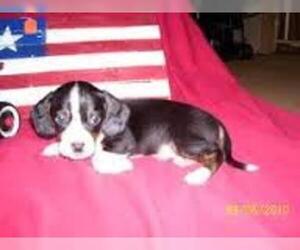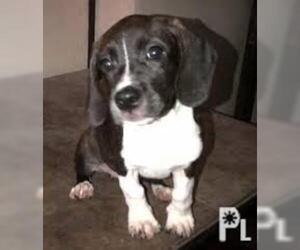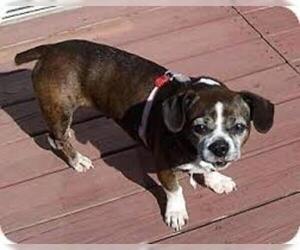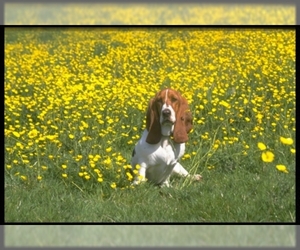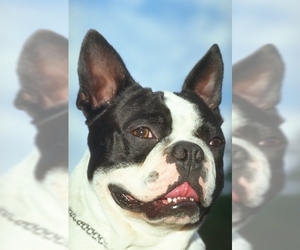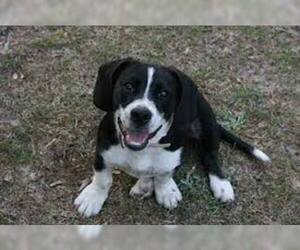
All about Basston dog breed
A.K.A. :Baston, Bosset, Bass-Terrier, Bass-Ter, Bost-Bass, Boston Basset, Basset Bostie, Boston Basset Terrier, Boston Bassie
Basston is a mix of
Size
Grooming requirements
Exercise requirements
Good with other dogs
Watchdog ability
Energetic
Training requirements
Playful
Affectionate
Good with other pets
Good with children
Good with strangers
Winter
Summer
Healthiness
Protective
Life Span
| Mixed Breeds | Member |
| Breeds A - Z | B |
| Breeds by Group | Hound Hunting |
| Breeds by Trait | Good With Kids Low Shedding |
| Overview: | The Basston, an endearing mix of the laid-back Basset Hound and the lively Boston Terrier, typically emerges as a charming companion dog. Originating from designer breed efforts to combine the best traits of its parents, the Basston often sports a compact to medium build, featuring the Basset's longer body and shorter legs, sometimes with the Boston's distinctive brachycephalic face. Their coats are generally short and easy to maintain, coming in various color patterns reminiscent of either parent. Temperament-wise, Basstons are known for being affectionate, good-natured, and moderately energetic, making them adaptable to various living situations, including apartment living, provided they receive daily walks and playtime. They are generally good with families and children, displaying a friendly and sometimes playful disposition. While a relatively healthy breed, potential health concerns can include those inherited from their parent breeds, such as back issues from the Basset Hound or respiratory considerations due to the Boston Terrier's facial structure, emphasizing the importance of responsible breeding and regular veterinary care. |
F.A.Q.
All You Need to Know About the "Basston" Breed (parent breeds: "Basset Hound" × "Boston Terrier")
Discover the delightful Basston, a charming hybrid blending the laid-back nature of the Basset Hound with the spirited personality of the Boston Terrier. Originating from these two beloved breeds, the Basston offers a unique companionship. Typically, they possess a friendly, affectionate, and sometimes comical temperament, making them excellent family pets. Physically, expect a sturdy, medium-sized dog with expressive eyes and a short, easy-care coat, though individual traits can vary. Their moderate energy levels make them suitable for both apartments and houses, provided they receive daily walks and playtime. Grooming is minimal, usually a weekly brush, but keep an eye on their ears and skin folds. Common health considerations might include back issues due to their potential longer bodies and respiratory concerns inherited from their Boston Terrier lineage. The Basston is a wonderful choice for those seeking a loving, adaptable, and entertaining companion.The average weight for an adult Basston is typically between 20-30 pounds. While individual dogs can vary, a healthy weight for Basston generally falls within this range. There isn't a significant, consistent weight difference between male and female Basstons; both can comfortably fit into this Basston weight bracket depending on their build and lineage from the Basset Hound and Boston Terrier parents. Always ensure your Basston maintains an ideal body condition for optimal health, consulting a vet if you have concerns about their average size.
Wondering about the Basston height and how tall this adorable hybrid can get? When it comes to the average size of a Basston, you can expect a compact and sturdy companion!
Typically, an adult Basston, a charming mix of the Basset Hound and Boston Terrier, will stand between 12 to 15 inches tall at the shoulder. This range gives them a low-to-the-ground profile reminiscent of the Basset, combined with the more upright stature of the Boston Terrier.Like many breeds, there can be some natural variation in Basston height. Factors such as individual genetics (which parent breed's traits are more dominant), diet, and overall health play a role. While not a dramatic difference, you might occasionally find a male Basston that is slightly taller or more muscular than a female, though this isn't a strict rule. Ultimately, each Basston is unique, but this average Basston height range provides a good guideline for what to expect from your furry friend.For the Basston breed, a charming mix of Basset Hound and Boston Terrier, coat colors vary widely. Basston colors generally include black, brindle, and fawn, often with white markings. These are common and widely accepted, reflecting their Boston Terrier heritage. Some Basstons may also exhibit colors more akin to the Basset Hound, such as tri-color (black, tan, and white), lemon and white, or red and white.Regarding AKC recognized Basston colors, it's important to note that the Basston is a designer breed and not currently recognized by major kennel clubs like the AKC. Therefore, there are no "official" AKC recognized Basston colors. However, reputable breeders typically aim for colors and patterns that are accepted in the parent breeds.Rare coat types and exotic Basston variations do exist, often due to recessive genes. These can include blue (a dilute black), chocolate (brown), and sometimes even lilac (a dilute chocolate). While visually striking, these exotic Basston variations may come with different pricing due to their rarity. Merle is another striking pattern that can occasionally appear, but it's important to be aware of potential health implications associated with the merle gene, especially in breeds not traditionally carrying it. Potential adopters should always prioritize health and temperament over specific rare colors.
The Basston personality is a delightful blend, often described as charmingly mischievous yet incredibly affectionate. These small to medium-sized dogs typically inherit the Basset Hound's laid-back, friendly nature combined with the Boston Terrier's vivacious, eager-to-please spirit. They are generally very friendly and sociable, thriving on companionship and interaction with their human families. This makes them excellent family pets, as they are typically good-natured with children, especially if socialized from a young age. Their loyalty is strong, often forming deep bonds with their primary caregivers. While they enjoy playtime and daily walks, their moderate exercise needs and adaptable size make them surprisingly well-suited for apartment living, provided they receive enough mental stimulation and outdoor activity. With other pets, especially if introduced properly, Basstons usually get along well due to their generally amiable temperament. Expect a clever, sometimes stubborn streak (a nod to the Basset), but overall a loving, playful, and wonderfully devoted companion.
Basston Temperament: A Charming, Adaptable CompanionThe Basston combines the laid-back charm of the Basset Hound with the spirited personality of the Boston Terrier, resulting in a lovable and adaptable companion dog. Generally known for their friendly and sociable disposition, Basstons are eager to be part of the family.Key Personality Traits:* Friendliness & Sociability: Basstons are typically outgoing and people-oriented, thriving on human companionship. They usually greet strangers with curiosity rather than caution, making them poor guard dogs but excellent social butterflies. Their sociable nature extends to other dogs and often to other household pets, especially with proper early socialization.* Loyalty: Expect a loyal and devoted companion who forms strong bonds with their family. They love to be near their people and often follow them from room to room.* Adaptability: This breed adapts well to various living situations, including apartment living, provided they receive sufficient daily exercise (a moderate walk or playtime is usually enough). They are not overly energetic but do enjoy outdoor adventures.* Behavior with Children: Basstons are generally good with children, possessing a patient and affectionate nature. As with any breed, supervision is essential, especially with very young children, to ensure respectful interactions from both sides.* Stubbornness & Sensitivity: You might encounter a degree of stubbornness, inherited from their Basset Hound lineage. This can manifest during training, requiring patience, positive reinforcement, and consistency. While not overly sensitive, they respond best to gentle handling and praise rather than harsh correction. They are eager to please but have their own minds.Overall, the Basston offers a delightful blend of affection, sociability, and adaptability, making them a wonderful addition to many different households seeking a loyal and charming companion.
Basston Care: Your Guide to a Happy, Healthy CompanionCaring for a Basston, a charming cross between a Basset Hound and a Boston Terrier, involves understanding their unique needs. This low-energy dog breed thrives with consistent, practical care.Grooming Needs: Basstons have short, dense coats that require minimal grooming. Weekly brushing with a rubber curry brush or a soft bristled brush is typically sufficient to remove loose hair and keep their coat healthy. Occasional baths are needed, especially if they've been exploring outdoors. Pay close attention to their skin, particularly within any folds or wrinkles, to prevent irritation.Exercise Limitations: Basstons are generally low-energy dog breeds. While they enjoy short walks and playtime, they are not suited for strenuous or prolonged exercise. Their short legs and potential for joint issues (inherited from the Basset Hound) mean overexertion should be avoided. A couple of short, leisurely walks daily, along with indoor play, will keep them content and prevent weight gain. Avoid exercise during the hottest parts of the day due to their brachycephalic anatomy.Dietary Considerations: Dietary considerations for Basstons are crucial for managing their weight and overall health. They have a tendency to gain weight, so a high-quality, measured diet is essential. Consult your veterinarian for appropriate portion sizes and food choices based on their age, activity level, and individual needs. Treats should be given sparingly.Wrinkle and Ear Cleaning: Due to their facial wrinkles (from the Boston Terrier) and often long, floppy ears (from the Basset Hound), wrinkle and ear cleaning for Basstons is a vital part of their daily maintenance. Clean wrinkles daily with a damp cloth or a veterinarian-approved wipe to prevent skin fold dermatitis. Their ears should be checked weekly for redness, odor, or discharge, and cleaned with a vet-recommended ear cleaner if necessary. This helps prevent ear infections.Climate Sensitivity (Brachycephalic Anatomy): Basstons inherit brachycephalic (short-nosed) features, making them sensitive to extreme temperatures. They are particularly prone to overheating in hot and humid weather. Climate sensitivity due to brachycephalic anatomy means they should always have access to shade and fresh water, and exercise should be limited to cooler parts of the day. Never leave a Basston in a hot car.Common Health Concerns and Health Tips for Basston:* Skin Issues: Due to their wrinkles, Basstons can be prone to skin fold dermatitis and other skin irritations. Regular cleaning and monitoring are key.* Dental Care: Like many small breeds, Basstons are susceptible to dental disease. Daily tooth brushing with dog-specific toothpaste is highly recommended, along with regular veterinary dental check-ups.* Weight Management: As mentioned, Basstons easily gain weight. Strict weight management for Basstons through controlled portions and appropriate exercise is critical to prevent joint problems, diabetes, and other obesity-related health issues.* Joint Issues: Be aware of potential back and joint problems, common in Basset Hounds. Avoid excessive jumping and support their long backs when lifting them.* Eye Problems: Monitor for signs of eye irritation or conditions, as Boston Terriers can be prone to certain eye issues.Understanding how to care for a Basston properly will ensure your furry friend enjoys a long, healthy, and happy life. Regular veterinary check-ups are paramount for early detection and prevention of health concerns.
The Basston activity level is generally moderate, blending the laid-back nature of the Basset Hound with the more sprightly Boston Terrier. They are not high-energy dogs, but they do enjoy and require regular exercise needs to stay healthy and happy.How active are Basston? You can expect your Basston to enjoy short to moderate daily walks, typically 30-45 minutes spread across the day, or a good 20-30 minute session. While they enjoy playtime, especially with toys or in a secure yard, these bursts of energy are usually followed by longer periods of rest and napping. Their playtime preferences often include chasing balls for a bit, then settling down for a good sniff around, or engaging in interactive puzzle toys that stimulate their minds.A key consideration for the Basston is their brachycephalic (short-nosed) anatomy, inherited from the Boston Terrier. This means they can be prone to overheating and respiratory difficulties, especially in warm weather or during strenuous exercise. Therefore, it's crucial to avoid overexertion and ensure they have access to shade and water. Keep walks shorter and during cooler parts of the day when temperatures are high.Basstons thrive in households that can offer a balanced routine of gentle activity and plenty of comfortable resting spots. They are generally suitable for low-to-moderately active families or individuals who enjoy daily strolls and indoor play. While they appreciate companionship and interaction, they are not ideal for highly active families seeking a jogging or hiking partner. They represent a good choice for those looking for a friendly, adaptable companion who balances short bursts of enthusiasm with long, contented naps.
Breed Breakdown: What Experts Say About the Basston
I'd rate the "Size" trait of the Basston a 3.5 out of 10.While not as diminutive as a true toy breed, the Basston leans heavily towards the smaller end of the canine spectrum, inheriting compact genes from both parent breeds. They typically stand under 15 inches tall and weigh between 15 and 25 pounds, showcasing a sturdy but distinctly small frame. Their body structure is often stocky like a Basset but without the exaggerated length, making them appear more proportionally compact than truly long. Compared to most companion dogs, they are noticeably smaller, falling into the "small to medium-small" category. This makes them exceptionally well-suited for apartment living, as they don't require vast amounts of space. Their manageable size also makes them excellent travel companions, easily fitting into carriers or coexisting comfortably in smaller vehicles. Households with space constraints will find the Basston a perfect fit, offering companionship without overwhelming their living area.
I'd rate the Basston's grooming requirements at a 6. This places them in the moderately high-maintenance category, not extremely difficult but certainly not wash-and-wear.The rating stems from a combination of factors inherited from both parent breeds. While the Basset Hound's short, dense coat is generally low-maintenance for shedding (though they do shed consistently), the Boston Terrier's fine, short coat also sheds, meaning the Basston will likely be a consistent, moderate shedder requiring regular brushing to manage loose hair and maintain coat health. Skin fold care is a significant concern. Both breeds, especially the Basset, are prone to wrinkles around the muzzle and eyes, which can trap moisture and debris, leading to infections if not regularly cleaned and dried. This alone pushes the maintenance up. Ear cleaning will also be a regular task; the Basset's long, pendulous ears are notorious for trapping dirt and moisture, making them susceptible to ear infections. While the Boston Terrier's ears are erect, the Basston could inherit the longer, floppier ear set, necessitating vigilant cleaning. Nail trimming is essential for all breeds, but with their activity levels and potential for quick growth, weekly to bi-weekly trimming will be important. Bathing needs will likely be moderate, perhaps monthly or as needed, but special attention will be required to thoroughly dry any skin folds. Finally, both parent breeds can be prone to allergies and skin sensitivities, meaning a Basston owner might need to be proactive in monitoring for hot spots or irritations, and potentially using specialized shampoos or diets, further increasing the grooming effort. Therefore, while not demanding daily professional grooming, the Basston requires consistent, attentive home care to prevent common issues.
I would rate the Basston's exercise requirements a 6 out of 10.The Basston inherits a mix of energy levels and physical limitations from its parent breeds. From the Basset Hound, it gets a generally lower-key demeanor and a love for sniffing, but also a propensity for weight gain if not exercised. The Boston Terrier contributes a more energetic, playful, and often mischievous side, eager for interaction. This combination typically results in a dog that isn't a couch potato but also not a marathon runner.Daily activity recommendations would lean towards moderate. They'll thrive with at least two good walks a day, totaling around 45-60 minutes, along with dedicated playtime in a secure yard or indoors. Their energy levels are moderate; they can have bursts of zoomies but are generally content to relax afterward. Tolerance for sustained movement is where the brachycephalic anatomy from the Boston Terrier comes into play. While they enjoy activity, they are more susceptible to overheating and respiratory distress, especially in warm weather or during intense exercise. Therefore, extended, vigorous activity like long jogs or hikes in hot conditions is not advisable and could be dangerous.They are suitable for various types of exercise, but with careful consideration. Leashed walks are essential for sniffing and exploring. Playtime with toys, fetch (in moderation), and puzzle toys are excellent for mental and physical stimulation. Agility might be a stretch due to potential Basset-like body structure and the brachycephalic limitations, though some individuals with more Terrier-like builds and less severe brachycephaly might enjoy it at a casual level.In essence, the Basston doesn't thrive with minimal activity; they require structured routines including daily walks and playtime to stay healthy and mentally stimulated. Without sufficient activity, they can become bored, destructive, or prone to weight gain. However, their physical limitations prevent them from being a high-endurance dog, making them a good fit for active families who enjoy regular, moderate exercise rather than intense athletic pursuits.
The Basston breed, a blend of Basset Hound and Boston Terrier, would likely rate around a 6 out of 10 for its watchdog ability. This rating reflects a dog that is generally alert and provides meaningful early warnings, but may not possess the strong deterrent factor of a more traditionally protective breed.The Boston Terrier parent contributes a significant amount of alertness and a propensity for barking at unfamiliar sounds or people. They are often quite aware of their surroundings and will typically vocalize to signal a new presence. This "early warning system" is a valuable asset. However, the Basset Hound influence tempers this. While Basset Hounds are known for their distinct vocalizations (bays), their deep-seated scent-driven nature often means their "alertness" is more focused on interesting smells than on perceived threats. They are generally friendly and less inclined to territorial aggression.Therefore, a Basston would likely be a good "doorbell" dog, readily barking to alert its owners to visitors or unusual noises outside. They would respond to unfamiliar sounds and people with vocalization, serving as a reliable first line of defense in terms of awareness. Their barking would likely be persistent enough to be noticed and acted upon by their human companions. However, their willingness to *deter* an actual intruder might be less pronounced. While their initial barking could be off-putting, their inherent friendly nature, especially from the Basset side, might lead them to be more curious or even seek attention rather than displaying aggressive territoriality. They are more likely to be a vocal early warning system than a physically formidable deterrent, making them a good choice for those seeking a companion who will reliably signal an approaching presence without being overly aggressive or challenging to manage. They are capable of providing meaningful early warnings in a home environment, effectively signaling an anomaly, but are more of an alert companion than a truly protective guardian.
I'd rate the "Good with Other Dogs" trait of the Basston a 7 out of 10.The Basston generally inherits a pleasant and adaptable disposition from both parent breeds, which contributes to their decent compatibility with other dogs. The Basset Hound is known for its laid-back and amicable nature, often getting along well with canine companions of various sizes and energy levels, especially when properly socialized. The Boston Terrier, while sometimes possessing a feisty streak, is typically good-natured and enjoys company, though they can occasionally display a playful but assertive side, particularly with other dogs that match their energy.A Basston's typical behavior around unfamiliar dogs is usually curious and friendly, rather than immediately aggressive or fearful. They tend to be adaptable in multi-dog households and can thrive in canine company, enjoying the social interaction. However, due to the Boston Terrier's potential for a bit of a "big dog in a small body" attitude, and the Basset Hound's occasional stubbornness, careful introductions are still advisable, especially with dogs of significantly different temperaments or energy levels. While outright aggression is uncommon, some Basstons might exhibit playful dominance during roughhousing, or display a lack of awareness of personal space that could annoy more sensitive dogs. Early socialization is, as with most breeds, key to ensuring they develop into well-adjusted and consistently dog-friendly companions. With consistent positive exposure and training, they are likely to coexist peacefully and even form strong bonds with other dogs.
I would rate the Basston's "Energetic" trait a 6 out of 10.The Basston is a fascinating mix, inheriting a blend of energy levels from its parent breeds. The Basset Hound is known for its more laid-back, leisurely pace, often content with short strolls and extensive napping. On the other hand, the Boston Terrier is a lively, playful, and often quite energetic dog, despite its smaller size. The Basston typically falls somewhere in the middle, displaying more pep and playfulness than a pure Basset Hound but generally not reaching the sustained high energy of a pure Boston Terrier. They enjoy daily walks, playtime in the yard, and interactive games, and have a moderate need for physical stimulation to prevent boredom and maintain a healthy weight.Their brachycephalic (short-nosed) anatomy, inherited from the Boston Terrier, is a crucial factor in their exercise tolerance. While they are enthusiastic about play, this conformation means they can be prone to overheating and respiratory difficulties, especially in warm weather or during strenuous activity. This limits their endurance and ability to participate in prolonged or intense outdoor and athletic activities compared to breeds with longer snouts. Therefore, while they possess a good deal of playful energy, responsible owners must be mindful of their physical limitations and provide appropriate, moderate exercise rather than expecting them to be a running or hiking companion. They are active enough to be engaging companions, but also appreciate downtime and cuddling, striking a balance that makes them more energetic than a typical Basset Hound, but not overly demanding like some higher-energy companion dogs.
I'd rate the "Training Requirements" of the Basston breed a 6 out of 10.The Basston presents a moderate training challenge, largely due to the interesting blend of its parent breeds. The Basset Hound contributes a significant degree of independent thought and stubbornness, often preferring to follow its nose rather than a command. This can lead to a shorter attention span, especially in stimulating environments. However, the Boston Terrier side brings intelligence and a desire to please, which can make them quite responsive when they choose to be. They are generally good-natured and willing to learn, but their occasional selective hearing, inherited from the Basset, means that consistency is absolutely paramount. Positive reinforcement is highly effective, as they respond well to praise, treats, and play, but any lapse in routine can quickly be exploited by their more obstinate tendencies. This breed is not entirely beginner-friendly, as an inexperienced owner might struggle with their independent streak. They benefit greatly from experienced handling and structured, consistent routines that establish clear boundaries and expectations from a young age. Early socialization and puppy classes are highly recommended to help them develop into well-adjusted companions.
I would rate the Basston's "Playful" trait a 7 out of 10.Basstons generally strike a delightful balance, inheriting a good portion of the Boston Terrier's effervescent enthusiasm while being tempered by the Basset Hound's more laid-back nature. They are typically quite active and enjoy games, especially interactive ones with their human companions. You can expect a good response to toys and an eagerness to engage in playtime, often initiating it themselves with a playful nudge or bark. While not as relentlessly energetic as some terrier breeds, their attention-seeking behavior manifests in a desire to be involved and a clear enjoyment of being the center of attention during play. They are naturally spirited and will happily join in on the fun, but they also appreciate downtime and aren't usually bouncing off the walls if you're not actively playing. This makes them more fun-loving than many companion dogs but also allows for periods of calm, making them adaptable to various household dynamics.
I would rate the Affectionate trait of the Basston breed a 9 out of 10.The Basston inherits a strong desire for human companionship and physical closeness from both its Basset Hound and Boston Terrier parents. Basset Hounds are known for their deep loyalty and tendency to follow their humans around, often seeking out a cozy spot nearby. Boston Terriers, on the other hand, are true "velcro dogs," thriving on being an integral part of the family and excelling at lap-sitting and cuddling. This combination results in a dog that is extremely loving and people-oriented, almost to the point of being a shadow. They are highly sensitive to their owner's emotions and will often seek to comfort or engage, always preferring to be in the same room as their family. The Basston absolutely thrives on affection and is rarely independent compared to other companion dogs, preferring to be in constant contact or close proximity to their loved ones.
I would rate the "Good with Other Pets" trait of the Basston as a 7/10.The Basston generally inherits a good disposition from both parent breeds, making them moderately to very pet-friendly. The Basset Hound is known for its laid-back, agreeable nature and often gets along well with other dogs and even cats, primarily due to its low prey drive. The Boston Terrier, while sometimes having a more energetic and playful personality, is also typically social and enjoys the company of other animals, often adapting well to multi-pet households.However, the "7" rather than a higher number acknowledges a few potential considerations. While generally low, some individual Basstons might inherit a slightly stronger prey drive from the Boston Terrier side, especially towards smaller, fast-moving animals like rodents, though this is less common with cats. Resource guarding can occur in any breed, and while not inherently high in either parent, proper socialization and training from a young age are crucial to prevent such tendencies, especially if food or toys are involved. While both breeds are generally adaptable, early positive experiences with other pets are vital to ensure they grow into well-adjusted companions. With proper introduction, socialization, and supervision, the Basston is naturally inclined to be sociable and can coexist peacefully and even form strong bonds with other animals.
Rating the "Good with Children" trait of the "Basston" breed (Basset Hound × Boston Terrier) at an 8.The Basston inherits a generally pleasant disposition from both parent breeds, making it quite suitable for families with children. The Basset Hound contributes a calm, patient, and very tolerant nature, often unfazed by the typical commotion and handling of children. This gentle giant tendency is a significant advantage. The Boston Terrier, while more energetic, is known for its affectionate and playful personality, often enjoying interactions with its human family, including kids. This combination typically results in a dog that is both patient and willing to engage in gentle play. They are generally not prone to aggression and are quite adaptable to varying noise levels and the sometimes-clumsy affection of young children. While they naturally possess a gentle and affectionate demeanor, as with any dog, early socialization and consistent, positive training are always beneficial to ensure they thrive in a family setting, particularly with very young children who need to learn how to interact respectfully with a pet. Supervision is always recommended, especially with toddlers, not due to inherent aggression from the Basston, but to teach both child and dog appropriate boundaries and interactions.
The Basston breed, a charming mix of Basset Hound and Boston Terrier, rates a 7 for "Good with Strangers." This hybrid typically exhibits a friendly and approachable demeanor, inheriting the Basset Hound's easygoing nature and the Boston Terrier's generally outgoing personality. Basstons are usually quite curious and amenable to meeting new people, often greeting unfamiliar adults with a wagging tail and a desire for attention, rather than displaying immediate suspicion or fear. While not overtly boisterous like some highly extroverted breeds, their inherent good nature makes them adaptable in public or guest-filled environments; they tend to settle in and observe or seek out interactions. They are unlikely to be aggressive or overly guarded, and while they may bark initially to alert to an arrival, this is generally followed by a welcoming posture. While naturally predisposed to being comfortable with strangers, consistent positive socialization from a young age will always reinforce this trait, ensuring they remain confident and well-mannered in all encounters. They generally do not require extensive or remedial training to be comfortable, but rather benefit from continued exposure to diverse people and situations.
I would rate the Basston's winter tolerance at a 4 out of 10.While the Basset Hound parent brings some level of body fat and a slightly denser coat than a pure Boston Terrier, the Basston will inherit a significant degree of cold sensitivity due to the brachycephalic nature of the Boston Terrier and the relatively short, single coat from both breeds. Their short legs mean their bodies are closer to the cold ground, and their moderate size offers less body mass to retain heat compared to larger breeds. The brachycephalic anatomy makes them susceptible to respiratory issues in cold, dry air, and increases their risk of hypothermia because they have to work harder to breathe and regulate their body temperature. They are likely to shiver quickly and their activity would be significantly limited in even moderately cold temperatures.Compared to many other companion dogs, the Basston definitely requires special care during winter months. They will need sweaters or coats for walks in cool weather, and outdoor activity should be brief in cold temperatures, with extreme cold being avoided altogether. Owners should be vigilant for signs of discomfort or hypothermia and ensure they have a warm, draft-free indoor environment.
I would rate the Basston's "Summer" tolerance at a 2.The Basston inherits significant characteristics from both parent breeds that contribute to its poor heat tolerance. The most critical factor is the brachycephalic anatomy from the Boston Terrier. This short, pushed-in muzzle severely limits their ability to cool themselves effectively through panting, making them highly susceptible to respiratory distress and heatstroke. While the Basset Hound has a longer muzzle, the dominant brachycephalic trait from the Boston Terrier will almost certainly override this advantage.Furthermore, both parent breeds have a tendency towards being somewhat robust in build. If the Basston inherits the Basset Hound's propensity for a heavier frame and lower energy levels, this combination with brachycephaly creates a "perfect storm" for overheating. Their ability to regulate body temperature is severely compromised. Outdoor activity during warm or hot weather would be extremely risky and should be limited to very brief, early morning or late evening walks in shaded areas, and only if the temperature is mild.Compared to other companion dogs, the Basston absolutely requires special care in summer months. They are at a significantly higher risk of heatstroke and will need constant access to air conditioning or other forms of climate control during hot weather. Even moderate temperatures can be dangerous for them. Owners must be vigilant for any signs of overheating, such as excessive panting, drooling, lethargy, or stumbling.
I'd rate the "Healthiness" trait of the "Basston" at a 6 out of 10.While the Basston benefits from hybrid vigor, which can sometimes reduce the incidence of diseases common to a single breed, both parent breeds bring their own set of significant health concerns to the table. Basset Hounds are notorious for their joint issues (hip and elbow dysplasia, intervertebral disc disease), ear infections due to their long, pendulous ears, and bloat. Boston Terriers, being a brachycephalic breed, frequently suffer from breathing difficulties (Brachycephalic Obstructive Airway Syndrome - BOAS), eye problems (cherry eye, cataracts), and patellar luxation.The Basston will likely inherit a mix of these predispositions. You're looking at a dog that could face a higher risk of respiratory issues due to some degree of brachycephaly, joint problems from the Basset side, and ongoing ear care. Skin folds, common in both breeds to varying degrees, can also lead to dermatological issues if not kept clean and dry. Life expectancy is generally moderate, often in the 10-14 year range, which is typical for medium-sized dogs.Therefore, the Basston is not considered an exceptionally robust breed. While not as fragile as some purebreds, it's certainly more high-maintenance in terms of potential health vigilance and preventive care compared to many other companion dogs. Responsible breeding can mitigate some risks by screening parents for common genetic disorders, but the inherent structural challenges from both parent breeds mean owners should be prepared for potential health challenges and ongoing veterinary care.
I'd rate the "Protective" trait of the Basston breed a 6 out of 10. They are likely to be more of an alert watchdog than a formidable guard dog, largely due to the influences of their parent breeds. The Basston inherits a decent level of alertness from both the Basset Hound's keen scenting ability (making them aware of novel presences, even if not threatening) and the Boston Terrier's generally watchful nature. Their territorial instincts will likely be moderate; they'll likely bark at new arrivals and possibly show some initial wariness, but are unlikely to be aggressively territorial. Loyalty to owners is usually high in both parent breeds, and this will translate to the Basston, making them want to inform their family of potential threats. Their reaction to strangers will likely involve initial barking and perhaps some standoffishness, but once a stranger is deemed non-threatening or accepted by the owner, the Basston is more likely to revert to a friendly demeanor. As a watchdog, they'd be excellent, reliably alerting you to anything out of the ordinary with their barks. However, as a guard dog offering meaningful physical protection in a household setting, they would fall short. Their size and temperament, while potentially brave, aren't typically suited for deterring serious threats. They are primarily companion dogs who will enthusiastically let you know if someone is at the door, but not a breed you'd rely on for a physical defense.
I would rate the Basston's "Life Span" trait at a 7 out of 10. This indicates a good, above-average lifespan for a companion dog.The Basset Hound typically lives 10-12 years, while the Boston Terrier boasts a longer average of 11-13 years, with many living even longer. The Basston, as a mix, benefits from hybrid vigor, which can often mitigate some breed-specific health issues. While both parent breeds can be prone to certain conditions – Basset Hounds to joint problems (like IVDD) and ear infections due to their long ears, and Boston Terriers to brachycephalic airway syndrome, eye problems, and patellar luxation – a well-bred Basston from responsible parents may experience fewer severe forms of these. With proper care, a balanced diet, regular exercise, and preventative veterinary check-ups, a Basston can realistically expect to live 12-15 years, placing them in the long-lived category compared to many other dog breeds, especially larger ones. Their moderate size also generally contributes to a longer lifespan than very large breeds.
Basston Dogs for adoptionSee all dogs for adoption
Similar Dog Breeds for Basston
Quick Breed Selector 0 - not important, 1 - smallest, 10 - largest
Variants & Mistakes :Bastton, Basson, Baston, Basstone, Bastonn, Basseton, Bassten, Bostonn, Bassetton, Boston, Bosston, Bostan, Bassatton, Basten, Bassatone, Bastone, Bostton
